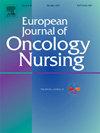探索心理弹性作为衰弱和老年癌症幸存者健康相关生活质量之间的中介:一项横断面研究
IF 2.7
3区 医学
Q1 NURSING
引用次数: 0
摘要
目的探讨心理弹性在老年癌症幸存者虚弱与健康相关生活质量(HRQoL)关系中的潜在中介作用。方法:这项横断面研究在日本和香港招募了314名老年癌症幸存者。对虚弱、心理弹性和HRQoL进行问卷调查。采用多变量线性回归分析各变量之间的相关性,并采用中介分析检验心理弹性作为脆弱性与整体HRQoL之间的中介。结果身体虚弱(β = -11.77, 95% CI: - 19.33, - 4.21, p = 0.002)和身体虚弱(β = -3.93, 95% CI: - 7.72, - 0.14, p = 0.042)的被试心理弹性明显低于健康个体。与健康组相比,虚弱与整体HRQoL、身体、角色和认知功能呈负相关(β值范围为- 17.22至- 14.00,p < 0.001),与疲劳(β值= 21.48,95% CI: 11.49, 31.46, p < 0.001)和疼痛(β值= 16.51,95% CI: 7.33, 25.69, p < 0.001)呈正相关。心理弹性与整体HRQoL、情绪、认知和社会功能呈正相关(β值范围从0.19到0.41,均p <; 0.001),与失眠负相关(β值= - 0.51,95% CI: - 0.73, - 0.30, p < 0.001)。心理弹性部分介导脆弱与整体HRQoL的关系,分别占虚弱前组和虚弱组总效应的32.3%和21.9%。结论心理弹性在老年癌症幸存者虚弱与HRQoL之间起中介作用。结合减少虚弱和增强恢复力策略的项目可能有助于改善老年癌症幸存者的HRQoL,特别是那些体弱或体弱的人。本文章由计算机程序翻译,如有差异,请以英文原文为准。
Exploring psychological resilience as a mediator between frailty and health-related quality of life among older cancer survivors: a cross-sectional study
Purpose
To examine the potential mediating role of psychological resilience in the relationship between frailty and Health related quality of life (HRQoL) among older cancer survivors.
Methods
This cross-sectional study recruited 314 older cancer survivors in Japan and Hong Kong. Questionnaires on frailty, psychological resilience, and HRQoL were administered. The associations among the variables were analyzed using multivariable linear regressions, and psychological resilience was tested as a mediator between frailty and global HRQoL using mediation analysis.
Results
Prefrail (β = -3.93, 95 %CI: −7.72, −0.14, p = 0.042) and frail (β = -11.77, 95 %CI: −19.33, −4.21, p = 0.002) participants showed significantly lower psychological resilience than robust individuals. Frailty was negatively associated with global HRQoL, physical, role, and cognitive functioning (β ranged from −17.22 to −14.00, all p < 0.001), and positively associated with fatigue (β = 21.48, 95 %CI: 11.49, 31.46, p < 0.001) and pain (β = 16.51, 95 %CI: 7.33, 25.69, p < 0.001) compared with robust group. Psychological resilience was positively associated with global HRQoL, emotional, cognitive, and social functioning (β ranged from 0.19 to 0.41, all p < 0.001), and negatively associated with insomnia (β = −0.51, 95 %CI: −0.73, −0.30, p < 0.001). Psychological resilience partially mediated the relationship of frailty and global HRQoL, accounting for 32.3 % and 21.9 % of the total effect in prefrail and frail groups, respectively.
Conclusion
Psychological resilience served as a mediator in the association between frailty and HRQoL in older cancer survivors. Programs incorporating frailty-reducing and resilience-enhancing strategies may be helpful to improve HRQoL among older cancer survivors, particularly those who are pre-frail or frail.
求助全文
通过发布文献求助,成功后即可免费获取论文全文。
去求助
来源期刊
CiteScore
4.40
自引率
3.60%
发文量
109
审稿时长
57 days
期刊介绍:
The European Journal of Oncology Nursing is an international journal which publishes research of direct relevance to patient care, nurse education, management and policy development. EJON is proud to be the official journal of the European Oncology Nursing Society.
The journal publishes the following types of papers:
• Original research articles
• Review articles

 求助内容:
求助内容: 应助结果提醒方式:
应助结果提醒方式:


